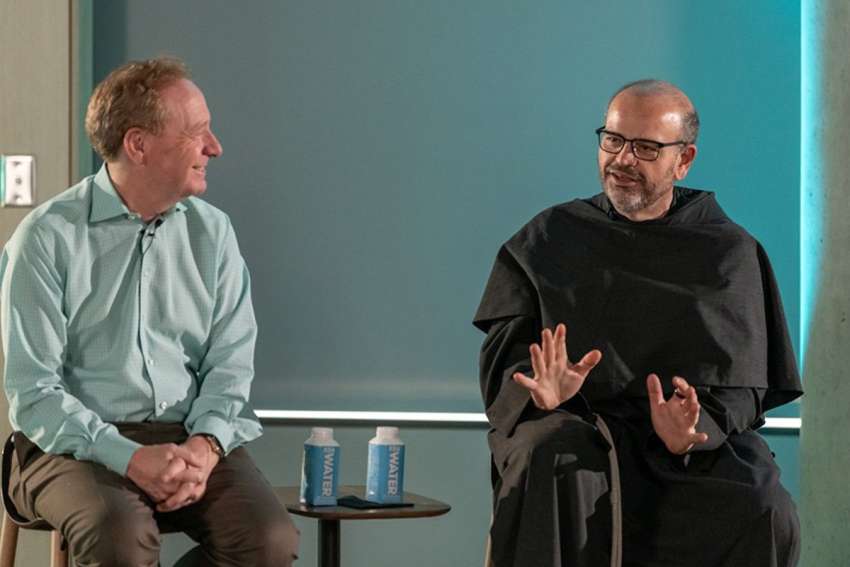Father Paolo Benanti, a member of the United Nations' advisory body on AI and adviser to Pope Francis on ethics and technology, visited the Microsoft campus July 23 for a conversation with Brad Smith, president of the tech giant.
Seattle University President Eduardo Peñalver introduced the "unlikely pair," who met five years ago at the Vatican while working on the development of the "Rome Call for AI Ethics," a document and commitment by entities around the world to embrace key principles in shaping technology.
Since then, the tech executive and humble priest have become key partners in promoting responsible AI.
During the discussion, they mused about their meetings, their travels and their commitments to the intersection between technology and ethics and how they are "calling AI to be in service to all humanity."
Smith shared how people questioned the relationship between Microsoft and the Catholic Church, noting criticism from people who do not agree with church teachings or felt the relationship with one religion was too narrow.
"If you look at the mission of the Catholic Church and the teachings, if you look at the mission of Microsoft -- they are all universal and embrace people from different backgrounds," Smith said. "In fact, if we can come together, then more people with more differences in the way they look at the world can come together. I just think that's a really good thing."
Susana Landeira, a Microsoft employee from the Dallas office, flew in to listen to the pair's discussion about ethics and technology.
"It's inspiring that I work at a company where I can bring my Catholic faith," she said, describing how meaningful it is to work on technology that has the power to do such good and have leaders who are striving for ethical development.
"That's why we're all here," she told Northwest Catholic, Seattle's archdiocesan magazine.
Signed by the Pontifical Academy for Life, Microsoft, IBM, FAO and the Italian government's Ministry of Innovation, the "Rome Call" was created Feb. 28, 2020, to promote an ethical approach to AI. The document covers ethics, education and rights, and is rooted in six principles covering transparency, inclusion, responsibility, impartiality, reliability, and security and privacy.
"We are exceeding our biology with technology," said Father Benanti, who described how technology allows people to achieve wonderful things, but at the same time requires people to understand "the impact and what it means to be responsible."
He added that this shared idea of responsible technology development was just one impetus for the Rome Call, which has more than 50 supporting organizations across business, religion and government.
Smith described how this "clearly 21st-century document" addresses ethical principles that are timeless, ensures AI serves all humanity -- "even the underprivileged" -- and requires that AI is developed in ways that are sensitive to needs of the climate.
"It was a remarkable community event where we collectively explored the current state of Generative AI within the framework of the Rome Call," said Ignacio Davila, customer senior program manager for Office AI and co-chair of the Catholics at Microsoft Employee Network. "I particularly valued Brad Smith's emphasis on ensuring AI technologies serve humanity and contribute to global peace and ethical standards. The journey will continue."
During his monthlong visit to Seattle, Father Benanti, a Franciscan friar, will support Seattle University's Technology Ethics Initiative engaging with students, faculty, staff and community members to enhance the university's work on ethics and AI.
"The ethical use of emerging technologies like artificial intelligence continues to be an important and challenging topic," Peñalver said. "As a Jesuit and Catholic institution, Seattle University is a leader in responding to opportunities these technologies present to serve a common good."


